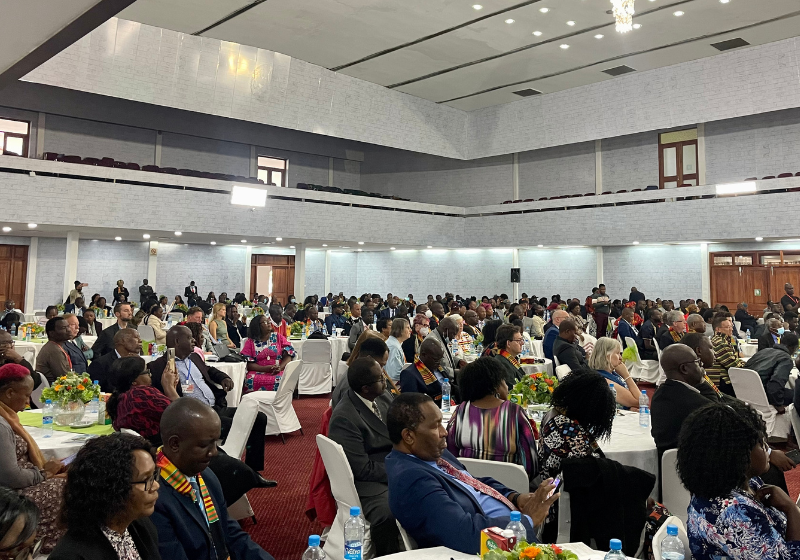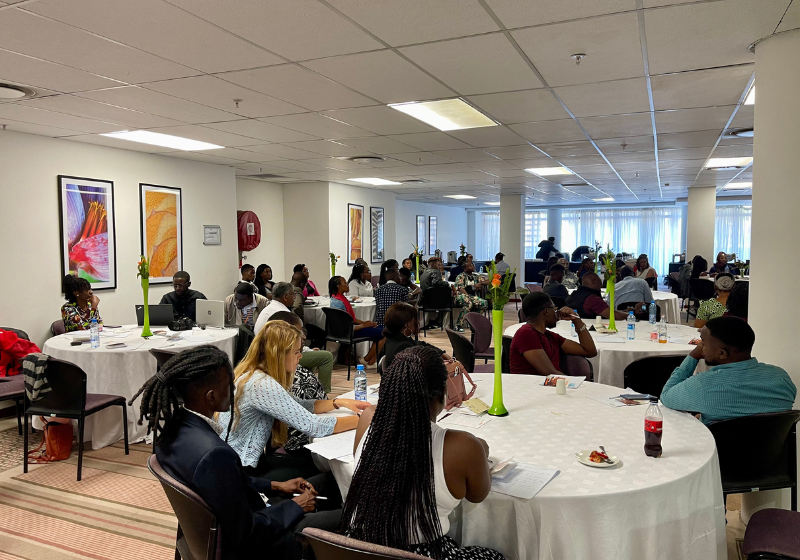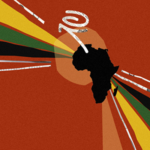If your ambition were to see greater numbers of trees in this world, where would you begin? Surely your passion, commitment, and investment would be towards seed beds and seedlings. Time would be given to ensure that saplings were supported while they were still supple and able to be straightened.
It was with this image in mind that Stephen Mbogo, the Lausanne Movement’s regional director of English, Portuguese, and Spanish-speaking Africa (EPSA) and CEO of African Enterprise, extended the invitation to young and developing leaders to attend national prayer breakfasts. Mbogo champions national prayer breakfasts across Africa, and through connecting younger leaders with more experienced leaders and politicians at the prayer breakfasts, he hopes to foster relationships that can develop and mature for years to come.
Jesus taught that leadership was not about a title but about serving others, and Mbogo believes that if this mindset towards leadership can be cultivated at a young age, then a whole generation of leaders and politicians can be influenced.

The inaugural prayer breakfast held in Lusaka, Zambia.
The Desire to See Prayer in Politics
The national prayer breakfast movement began seventy years ago when Norwegian-born Abraham Vereide, together with former American president Dwight Eisenhower and American Douglas Coe, saw the need for mobilising political leaders through prayer. Together they established the national prayer breakfast in the US.
The annual US prayer breakfast allows members of congress and other influential leaders to connect and develop relationships, support one another, receive relevant Christian input, and pray together.
‘There are three strands that comprise the prayer breakfast: the person of Jesus and his teachings, friendship between world leaders and influencers, and prayer,’ says Carlton Deal, international coordinator of the European prayer breakfast. ‘What separates a prayer breakfast from any church breakfast is the involvement of parliament.’
Most leaders who have been attending national prayer breakfasts for a long time would say that the highest priority of the event is that the name of Jesus is lifted up.
While some people might walk into a prayer breakfast and think it is an interreligious gathering, and that might be true, it is by no means an ‘interfaith’ gathering. For example, at one prayer breakfast meeting, a Jewish man named Arthur Burns prayed, ‘Dear God, I pray that all the Jewish people in the world will come to know Jesus. Dear God, I pray that all the Muslims in the world will come to know Jesus. Dear God, I pray that all the Christians in the world will come to know Jesus. Dear God, I pray that everyone in the world will come to know Jesus.’
When asked what the most important commandment is, Jesus responded by saying, ‘Love the Lord your God with all your heart and with all your soul and with all your mind. This is the first and greatest commandment. And the second is like it: ‘Love your neighbour as yourself’ (Matt 22:37-39). Following these two central instructions given by Jesus are also what makes the prayer breakfast so challenging to navigate. How can it be led in such a way that the people who come who would not describe themselves as Christians still feel honoured, respected, and able to participate, while giving Jesus the central focus of the event?
Prayer Breakfast Initiated in Africa
In 1996 following the genocide in Rwanda, African Enterprise founder Michael Cassidy, along with the late South African archbishop Desmond Tutu, came into the country to address and comfort the nation. In the final event, leaders of government came together and prayed for the country. This led to the prayer breakfast movement beginning in Rwanda.
Today Stephen Mbogo, who is not only a Christian leader but also has his PhD in political science, serves as organiser and champion of seeing national prayer breakfasts established in more African countries.
The national prayer breakfast provides an opportunity for lay people, people in business, as well as clergy to come together with members of parliament in order to lift up one another in prayer and elevate the calling of leadership.

Stephen Mbogo (second from right) with younger and older leaders from Zambia during this year’s African Enterprise 60th anniversary celebration, which included mission initiatives throughout Lusaka.
‘The whole goal is to see members of parliament reaching out to their peers,’ Mbogo shares. ‘When I speak to politicians it is possible for them to say, “Well, he’s a preacher”, but when they hear their own peer, a member of parliament, speaking, they are excited because they know they share a similar experience.’
In 2003 Kenya was coming out of a period where a particular political party had ruled the country for nearly forty years. Freedom of speech was very limited and a lot of Christians were wondering how they could express themselves and be a light in the darkness.
‘And we began asking ourselves, how do we reach out to our political leaders? How do we begin bringing them together for collaboration? For prayer?’ They found that there was a group within parliament asking similar questions, and it was from these two groups coming together that the Kenyan National Prayer Breakfast was born, continuing annually for nearly twenty years. South Sudan has also experienced the benefits of an annual prayer breakfast, and likewise other African countries.
Article
For Such a Time as This
A Christian politician in the Philippines brings hope after Typhoon Haiyan.
More Than Just a Breakfast
Mbogo’s vision is to see all of Africa impacted through impacting Africa’s leaders. ‘If we influence leaders, we will influence entire nations’, he says.
According to Proverbs 29, ‘When the righteous rule, the people live in peace. When the wicked rule, the people groan.’ Likewise, Mbogo says there is an African saying from Ethiopia: ‘When the leader goes leaping, the people begin leaping, imitating the leader.’
He continues, ‘In Kenya we say, “When the fish begins rotting, it begins with the head”.’ National prayer breakfasts have become a compelling way to influence leaders on the African continent, to engage them in prayer, and thereby impact entire nations.
This not only happens through annual prayer breakfast events, but through ongoing Bible studies. ‘The goal is to see members of parliament meeting during the week to go through the Bible and spend time in prayer. The vision is to disciple Africa’s leaders so they can be driven by biblical values. That is my burden, and that is the burden of many other ministries working in Africa right now,’ says Mbogo.
This is the strategy that many African countries have taken, including Zambia, where just a few weeks ago the inaugural prayer breakfast was launched in Lusaka. Mbogo found himself privileged to be seated with members of Zambian parliament, including the present vice president, Mutale Nalumango. Malumango has resolved to see the Zambian Cabinet meeting regularly for Bible study, prayer, and annual gatherings such as the prayer breakfast. She is determined to strive for a leadership which is above reproach.
Leaders Worth Emulating
Through Stephen Mbogo’s emphasis with African Enterprise on mentoring younger leaders in schools and universities, he is able to connect younger leaders to older leaders and politicians by inviting them to attend national prayer breakfasts in Africa. This allows younger leaders in Africa to see that, despite hearing about overwhelming corruption in leadership, there are leaders in the business sector and in parliament worth emulating.
‘This long-term mentorship initiative means that in ten to twelve years, we will be able to see a young man or a young woman who was in primary school when the nurturing started, go through primary school, high school, and finally reach a position in society where they are value-driven and embracing service-leadership,’ says Mbogo.

The Younger Leaders Forum in Lusaka was recently held in conjunction with the inaugural prayer breakfast.
‘This is the dream that we have, and I see it all being tied to the national prayer breakfast movement where we are trying to raise leaders who are value-driven and servant-hearted.’
‘Right now, we are working with ten primary schools, ten high schools, and groups of university students in Juba, South Sudan,’ says Mbogo. ‘Through this and the national prayer breakfasts, we believe we are taking steps to see change implemented in the African continent.’
Prayer breakfasts globally are developing the same emphasis on mentoring and equipping the next generation, connecting younger leaders with more experienced leaders and seeking to inspire them with upstanding values and leadership that centres integrity.
Impacting Society with the Next Generation in Mind
National prayer breakfasts are impacting politicians and leaders in the public sphere all over the world and the global church eagerly anticipates the positive impact this movement will have on younger generations as they become global leaders and influencers today and beyond.
Political leaders can seem so far removed from the average citizen, but these individuals often feel isolated, unsupported, and struggle with many of the same challenges that their fellow citizens face.
In 1 Timothy 2:1-3 Paul writes, ‘I urge, then, first of all, that petitions, prayers, intercession and thanksgiving be made for all people—for kings and all those in authority, that we may live peaceful and quiet lives in all godliness and holiness. This is good, and pleases God our Saviour.’ The national prayer breakfast movement in Africa provides a unique opportunity for political leaders to personally receive prayer and pray for others in politics, bringing them and their area of influence before God’s throne of grace.
The Lausanne Movement is seeking to accelerate global mission and see kingdom impact in every sector of society with the next generation in mind. The prayer breakfast movement in Africa highlights one way we see the political arena laying hold of the opportunities and facilitating regional collaboration in light of 2050, when today’s under-20 generation will be in key roles of government, leadership, and influence.



